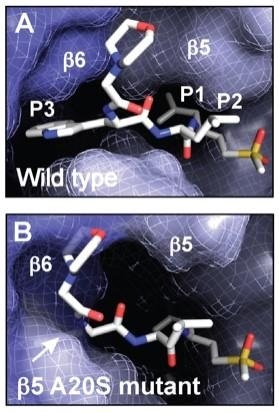Proteasome inhibitors have significant promise as components of novel combination therapies to treat multidrug-resistant malaria, according to a study published June 6 in the open-access journal PLOS Pathogens by David Fidock, Caroline Ng, and Barbara Stokes of Columbia University Irving Medical Center, Matthew Bogyo of Stanford University School of Medicine, and colleagues.

In silico modeling of the Plasmodium falciparum 20S proteasome bound by the covalent parasite-selective WLL peptide-based inhibitor. (A) Docking of WLL into the wild-type b5 site of the cryo-electron microscopy-derived 20S parasite proteasome model. The b5 and b6 subunits are in light blue and dark blue, respectively. (B) Molecular dynamic simulations illustrate how the b5 A20S mutation affords low-level resistance to WLL by reducing compound binding to the b5 active site. Arrow highlights the WLL P3 tryptophan residue. Credit: Stokes, et al. (2019)
The spread of drug-resistant malaria, caused by the protozoan parasite Plasmodium falciparum, across Southeast Asia highlights the urgent need to develop new treatment options with compounds that are not susceptible to existing mechanisms of antimalarial drug resistance. Recent work has identified the P. falciparum proteasome – a protein complex that degrades unneeded or damaged proteins – as a promising drug target. In the new study, the researchers characterized the antimalarial activity of two P. falciparum-selective proteasome inhibitors – the covalent peptide vinyl sulfones WLL-vs (WLL) and WLW-vs (WLW).
The inhibitors exhibited potent antimalarial activity against drug-resistant P. falciparum early ring-stage parasites that are traditionally difficult to treat. Moreover, parasites did not readily acquire resistance to these proteasome inhibitors, unlike many advanced antimalarial candidates. No parasites were observed to be cross-resistant to both compounds; in fact, partial resistance to one compound often created hypersensitivity to the other. These data were explained by activity-based profiling of the proteasome complex and molecular modeling of its interactions with these inhibitors. The findings also revealed potent synergy between these proteasome inhibitors and multiple, chemically diverse classes of antimalarial agents. According to the authors, these results underscore the potential of targeting the Plasmodium proteasome with small molecule inhibitors as a means of combating multidrug-resistant malaria.
Source:
PLOS
Journal reference:
Stokes, B.H. et al. (2019) Covalent Plasmodium falciparum-selective proteasome inhibitors exhibit a low propensity for generating resistance in vitro and synergize with multiple antimalarial agents . PLOS Pathogens. doi.org/10.1371/journal.ppat.1007722.